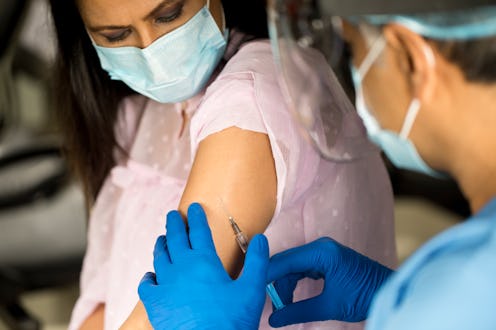Health
A Doctor Explains Why Your Arm Hurts Post-Vaccine
It’s actually a good sign.

Pretty much everyone and their mom is waiting eagerly to hear that it's their turn to get the COVID vaccine —but the reality that it's an actual shot isn't super fun. After you breathe through the quick injection, it's normal to feel a bit betrayed when your body's all, "Thanks for keeping us safe, we're gonna be sore now." Figuring out why your arm hurts post-COVID vaccine can help you take it easy as you prep for your first (and then your second) shot.
Why Does The Vaccine Make Your Arm Hurt?
"When you receive a vaccination, your immune system gets activated in order to build a protective response against the viral protein," says Dr. Sanjeev Jain, M.D., a doctor double-board certified in immunology and internal medicine at Columbia Asthma and Allergy Clinic. In other words, your body gets a small, safe taste of the virus and gets to work at creating defenses against it — which is great for your overall health, but a bit finicky in your arm for a couple of days.
The reason your arm hurts has to do with your body's healing response. "As your immune system is activated, there is a transient release of inflammatory mediators that can lead to symptoms such as soreness, redness, and swelling at the injection site or of the adjacent lymph nodes, as well as fever, muscle aches, and headache," Dr. Jain explains.
Is Arm Pain Normal After A COVID Vaccine?
According to the Centers for Disease Control and Prevention (CDC), arm soreness is an expected side effect of COVID-19 vaccines. In Johnson & Johnson's COVID vaccine clinical trials, most participants experienced some injection site pain in their arm, which is on par with Moderna and Pfizer's research, which indicates that over 83% and 84% of folks (respectively) experience arm soreness after getting their vaccine.
Arm pain post-shot isn't unique to the COVID vaccine — if you're gotten your flu shot in the last few years, you know that the arm soreness is often par for the course. Typically, you'll only be sore for a day or two. The pain might last a bit longer if you're bruised as well, Dr. Jain says. Sometimes the injection disrupts a blood vessel, hence a bruise and a bit more soreness. "Bruising is not a concern in itself, and if the soreness is due to a visible bruise, this soreness may last up to two weeks," Dr. Jain tells Bustle.
Arm pain is normal, but a severe reaction is not. If you're vomiting, your face is swelling, or you've got numbness or tingling in your fingers and toes, then Dr. Jain says it's time to check in with your doctor. Run-of-the-mill soreness, however, is common and should dissipate on its own.
How Can I Help Post-Vaccine Arm Soreness?
Though the soreness generally goes away on its own within a couple of days, you probably would rather not be in pain or discomfort. Dr. Jain says it should help to ice the area for 20 minutes at a time, a few times a day. You can also take Tylenol to help alleviate the discomfort, and try to move your arm around a bit to get the blood flowing (making your arm a bit less stiff and painful). However you decide to cope with post-vaccine soreness, congratulate yourself — a bit of arm pain now translates into a lot of immunity later.
Expert:
Dr. Sanjeev Jain, M.D., doctor double-board certified in immunology and internal medicine, Columbia Asthma and Allergy Clinic
This article was originally published on